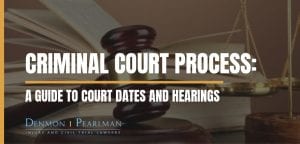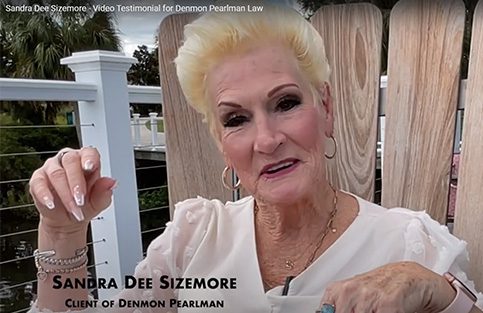Our Expertise
We have your back. Whatever you might be suffering from, accidents, injuries or medical malpractice, we have you covered throughout Florida
Let’s get in touch!
The initial consultation is absolutely FREE
Denmon Pearlman
Law
Tampa Office
2504 W Crest Ave
Tampa, FL 33614
(813) 554-3232
Denmon Pearlman
Law
St. Petersburg Office
520 2nd Ave South
St. Petersburg, FL 33701
(727) 493-5610
Denmon Pearlman
Law
New Port Richey Office
5703 Main Street
New Port Richey, FL 34652
(727) 753-0049
Denmon Pearlman
Law
Brooksville Office
1790 E Jefferson St.
Brooksville, FL 34601
(352) 309-7354
Denmon Pearlman
Law
Seminole Office
5290 Seminole Blvd. Suite D
St. Petersburg, FL 33708
(727) 655-9467
Arrested? Wondering if and when you will see a judge? Below we go through the Criminal Court Process and list the different types of court dates that may occur during your criminal case. They are listed in the general order that they happen. Not every criminal case has every court date listed below.

First Appearance
When to Expect: 24 hours after your arrest.
Florida’s Constitution requires that you appear in front of a judge within 24 hours of your arrest. This court appearance is also known as an advisory. It occurs within 24 hours of your arrest. This court date will not occur if you have already posted bond and have been released from jail.
In certain cases, the arresting agency will not give you a bond. For example, if you have been charged with a serious crime or a domestic-related crime, the arresting agency may leave you at a “no bond” status. You cannot be released from jail when you have a “no bond” status and must await your First Appearance court date for a judge to address your bond.
The success of any legal matter depends on the unique circumstances of each case, therefore, we cannot guarantee particular results for future clients.
Arraignment
When to Expect: Approximately four weeks after arrest.
This date generally occurs within three to four weeks of your arrest. At this court date, a judge officially informs you of the charges the state has filed or intends to file against you. You respond that you are either guilty or not guilty of the charge. If you have retained a criminal attorney, he or she will most likely waive your appearance at this court hearing.
If you have not retained an attorney, the court will inquire as to your need for a public defender. Many jurisdictions appoint a public defender at your arraignment. Others require you to fill out an application to determine your eligibility. In order to receive the services of a public defender, you will have to swear under oath (either in court or on your application) that your wages and assets are below a predetermined amount.
Pretrial Conference
When to Expect: Every three to four weeks after the arraignment until the case is resolved.
A pretrial conference is a court date to determine if you want to enter a plea agreement or need additional time to prepare a motion. The number of pretrial court dates depends on the complexity of the issues involved in your case.
Several pretrial conferences may be required so that your attorney can adequately prepare your defense. For example, your attorney may choose to engage in plea negotiations, conduct depositions, file motions, and/or prepare for trial. Your attorney may choose to waive your appearance at one or more pretrial conferences.
Each pretrial conference is also a chance for your attorney to discuss the case with the prosecutor as well as address small issues with the judge. For example, if the prosecutor is late with his or her discovery obligation (providing your attorney with the evidence being used against you), your criminal lawyer can address it with the judge at a pretrial conference.
Motion To Dismiss
When to Expect: Set by your attorney after discovery is complete.
A motion to dismiss requests complete dismissal of the charge against you. A motion to dismiss is appropriate when the State’s Attorney would not be able to prove your case even if the facts as alleged were true.
Motions to dismiss are often done without testimony; instead, they are done with arguments from the attorney and the prosecutor (each of whom will likely cite one or more pieces of case law). If you win your motion to dismiss, the charge against you is dismissed and you will not have other court dates.
Motion To Suppress
When to Expect: Set by your attorney after discovery is complete.
In many cases, police officers overstep their bounds during the investigation and subsequent arrest process. If they have violated your constitutional rights with an improper search or seizure of you or your property or person, your attorney may file a motion to suppress evidence.
In effect, your attorney is asking the judge to recognize that the police and the State violated your rights by not allowing them to introduce certain evidence against you at trial. Depending on the illegal conduct, this can damage or even obliterate the State’s case.
Motions to suppress usually happen before trial. Sometimes judges allow motions to be heard the day of trial. Generally, you are present during your motion to dismiss hearing.
A Trial in the Criminal Court Process
As part of the Criminal Court Process, a trial can be by jury or conducted in front of a judge (a bench trial). A trial occurs when an accused individual maintains his or her innocence and pleads not guilty throughout all court dates leading to trial. Your presence is required at trial. At trial, the state must prove that the accused committed the crime beyond a reasonable doubt.
If the accused is found guilty, a judge determines a sentence. If the State fails to prove beyond a reasonable doubt that the accused committed the crime, the jury or judge will find him or her not guilty. Thus, the accused will not receive any punishment — even if he or she actually committed the crime!
Do I Have To Attend Every Court Date?
In most cases, your criminal defense attorney can get permission for you to miss court while he or she attends on your behalf. However, different judges have different rules. Be sure to check with your lawyer before every court date to see if you must attend.














